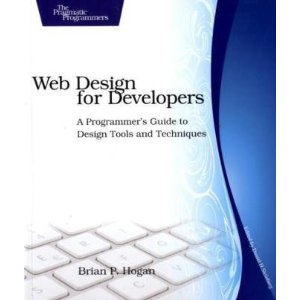Web Design for Developers by Brian Hogan

I majored in engineering and computer science. I studied rigorous math, scoured through endless technical manuals and banged my head against many desks trying to decode unfathomable formulas. I took these skills into the work world and applied them to the best of my ability. I believe all of my employers would say I did this quite well. Throughout this time, I always strived to continue my education. The rapid pace of technology forces one to. But even though I made a fair share of websites, and worked in the industry for a fair number of years, if I sit down at a blank computer screen with the goal of designing a elegant and simplistic website, I become dumbfounded.
The problem is that in all my years of experience, I picked up web design on the fly. I’m more of a technical person, and the basics of html, css and javascript were easy for me to pick up and run with. But the ability to design requires more of an artistic edge rather than a technical one. I’ve never been much of an artist, but I wanted to give web design a shot. So I purchased two web design books from Amazon, and the first one I read is the suitably titled Web Design for Developers.
Now this book doesn’t explore uncovering your hidden emotional side to create grave masterpieces of artistry, but rather takes you through the web development process from a designers point of view. Along the way, it covered basic stuff I already knew, stuff I used but did not know why, and a fair mix of new concepts which I wasn’t aware of before.
Some new techniques which I learned are using Photoshop to mock up your pages before touching html, how spacing between lines can be arranged by the pixel for more aesthetically pleasing sites and accessibility is more general than only handicapped people. Amusingly I found the example web page that the book uses throughout to be a little bland. The authors introductory prose keeps the pages turning quick and makes this a book that can be finished in a few sittings.
This book was worth reading simply because I find the knowledge much easier to retain when studying it in the quietness of my living room rather than as a secondary task while I’m working on developing a web site. It convinced me to purchase an HTML-5 book when the specification is complete just so I won’t have to waste time searching for basic techniques on the internet when developing a site. I’m definitely not a professional designer as a result from reading this book, but now I know I have a foundation to become a better one.